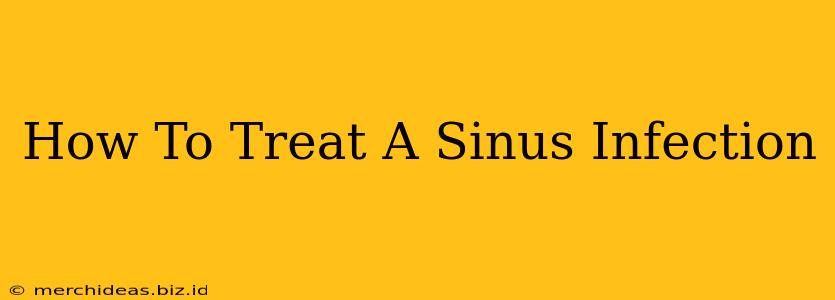A sinus infection, or sinusitis, is a common ailment causing inflammation and swelling in the sinuses. This inflammation can block the sinuses, leading to pressure, pain, and congestion. While many cases resolve on their own, knowing how to treat a sinus infection effectively can significantly alleviate symptoms and speed up recovery. This guide will explore both home remedies and medical treatments for sinus infections.
Understanding Sinus Infections
Before diving into treatment, let's understand what causes sinusitis. Most infections are caused by viruses, but bacteria or fungi can also be culprits. Common symptoms include:
- Facial pain and pressure: This is often described as a deep ache in the cheeks, forehead, or between the eyes.
- Congestion: A stuffy nose makes breathing difficult.
- Headache: The pressure from the inflamed sinuses contributes to headaches.
- Thick nasal discharge: This may be clear, yellow, or green.
- Reduced sense of smell and taste: Inflammation can affect your olfactory senses.
- Cough: Postnasal drip from the sinuses can irritate the throat and cause coughing.
- Fever: A fever is more common with bacterial infections.
Home Remedies for Sinus Infection Relief
Many home remedies can help manage sinus infection symptoms and promote healing. It's crucial to remember that these remedies are supportive and may not cure the infection entirely, especially if it's bacterial. Always consult a doctor if symptoms worsen or persist.
1. Saline Nasal Rinse: Flushing Out Irritants
A saline nasal rinse is a simple yet effective way to clear nasal passages of mucus and irritants. You can use a neti pot or a squeeze bottle to gently flush your nasal passages with a saline solution. Make sure to use distilled or sterile water to avoid introducing bacteria.
2. Hydration is Key: Drinking Plenty of Fluids
Staying hydrated helps thin the mucus, making it easier to drain. Drink plenty of water, clear broths, and herbal teas throughout the day.
3. Steam Inhalation: Soothing Congestion
Inhaling steam can help loosen mucus and relieve congestion. Inhale the steam from a bowl of hot water, adding a few drops of eucalyptus or peppermint essential oil for added relief (be cautious with essential oils, always dilute them properly). Never inhale boiling water directly.
4. Warm Compress: Reducing Pain and Swelling
Applying a warm compress to your forehead or cheeks can help reduce pain and swelling in the sinuses.
When to Seek Medical Attention for a Sinus Infection
While home remedies can offer relief, it's essential to seek professional medical attention if your symptoms:
- Persist for more than 10 days: This might indicate a bacterial infection requiring antibiotics.
- Worsen significantly: Increased pain, high fever, or severe headache warrant immediate medical attention.
- Are accompanied by other symptoms: Facial swelling, vision changes, or severe fatigue require prompt evaluation.
- Recur frequently: Chronic sinusitis may require more intensive treatment.
Medical Treatments for Sinus Infections
Your doctor might recommend several treatments based on the severity and cause of your infection:
- Antibiotics: These are prescribed for bacterial infections, but they are ineffective against viral infections.
- Decongestants: These medications can help relieve congestion but should be used cautiously and not for extended periods.
- Nasal corticosteroids: These sprays can reduce inflammation in the nasal passages.
- Pain relievers: Over-the-counter pain relievers like ibuprofen or acetaminophen can help manage pain and fever.
- Surgery: In rare cases, surgery may be necessary to correct structural problems in the sinuses that contribute to recurrent infections.
Preventing Sinus Infections
While you can't always prevent sinus infections, you can take steps to reduce your risk:
- Avoid allergens: Identify and avoid allergens that trigger your symptoms.
- Wash your hands frequently: This helps prevent the spread of infections.
- Quit smoking: Smoking irritates the sinuses and increases the risk of infection.
- Manage underlying conditions: Conditions like allergies and immune deficiencies can increase susceptibility to sinus infections.
Disclaimer: This information is for educational purposes only and should not be considered medical advice. Always consult a healthcare professional for diagnosis and treatment of any medical condition. Self-treating can be dangerous, so it's vital to get a proper diagnosis and follow your doctor's recommendations.
